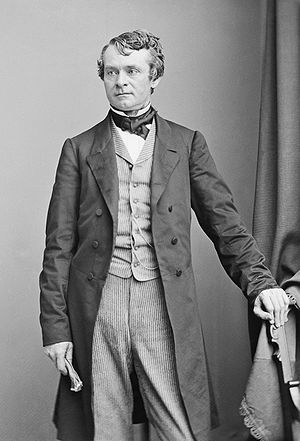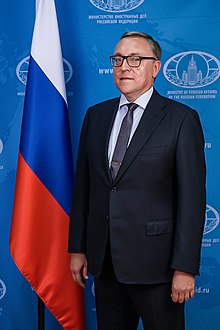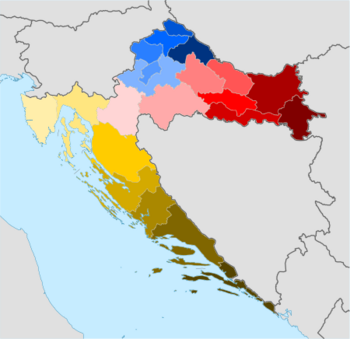Wikip
Portal:Politics
| Main | Topics and categories | Tasks and projects |
The Politics portal
Politics (from Ancient Greek πολιτικά (politiká) 'affairs of the cities') is the set of activities that are associated with making decisions in groups, or other forms of power relations among individuals, such as the distribution of resources or status. The branch of social science that studies politics and government is referred to as political science.
It may be used positively in the context of a "political solution" which is compromising and non-violent, or descriptively as "the art or science of government", but also often carries a negative connotation. The concept has been defined in various ways, and different approaches have fundamentally differing views on whether it should be used extensively or in a limited way, empirically or normatively, and on whether conflict or co-operation is more essential to it.
A variety of methods are deployed in politics, which include promoting one's own political views among people, negotiation with other political subjects, making laws, and exercising internal and external force, including warfare against adversaries. Politics is exercised on a wide range of social levels, from clans and tribes of traditional societies, through modern local governments, companies and institutions up to sovereign states, to the international level.
In modern nation states, people often form political parties to represent their ideas. Members of a party often agree to take the same position on many issues and agree to support the same changes to law and the same leaders. An election is usually a competition between different parties.
A political system is a framework which defines acceptable political methods within a society. The history of political thought can be traced back to early antiquity, with seminal works such as Plato's Republic, Aristotle's Politics, Confucius's political manuscripts and Chanakya's Arthashastra. (Full article...)
Selected article
The Scottish Parliament is the national unicameral legislature of Scotland, located in the Holyrood area of Edinburgh. The Parliament is a democratically elected body with 129 members who are known as Members of the Scottish Parliament (MSPs). Members are elected for four year terms under the proportional representation system. The original Parliament of Scotland was the national legislature of the independent Kingdom of Scotland and existed from the early thirteenth century until the Kingdom of Scotland merged with the Kingdom of England under the Acts of Union 1707 to form the Kingdom of Great Britain. Following a referendum in 1997 where the Scottish people gave their consent, the current Parliament was established by the Scotland Act 1998 which sets out its powers as a devolved legislature. The Act delineated the areas in which it can make laws by explicitly specifying powers that are "reserved" to the Parliament of the United Kingdom. All matters that are not explicitly reserved are automatically the responsibility of the Scottish Parliament. The UK Parliament retains the ability to amend the terms of reference of the Scottish Parliament, and can extend or reduce the areas in which it can make laws. The first meeting of the new Parliament took place on 12 May 1999.
Featured picture

Andrew Gregg Curtin (1817–1894) was a U.S. lawyer and politician. He served as the 15th Governor of Pennsylvania during the American Civil War. During the Civil War, Curtin organized the Pennsylvania reserves into combat units, and oversaw the construction of the first Union military camp for training militia. After the Battle of Gettysburg, Governor Curtin was the principal force behind the establishment of the National Cemetery there. After serving two terms as governor, Curtin was appointed ambassador to Russia by Ulysses S. Grant, and he later served in the House of Representatives from 1881 until 1887.
Selected quote
Selected biography
Józef Piłsudski (1867–1935) was Chief of State (1918–22), "First Marshal", and authoritarian leader of the Second Polish Republic. From mid-World War I he was a major influence in Poland's politics, and an important figure on the European political scene. He is considered largely responsible for Poland regaining independence in 1918, after 123 years of partitions. Early in his political career, Piłsudski became a leader of the Polish Socialist Party. Concluding, however, that Poland's independence would have to be won by force of arms, he created the Polish Legions. In 1914 he anticipated the outbreak of a European war, the Russian Empire's defeat by the Central Powers, and the Central Powers' defeat by the western powers. When World War I broke out, he and his Legions fought alongside the Austro-Hungarian and German Empires to ensure Russia's defeat. In 1917, with Russia faring badly in the war, he withdrew his support from the Central Powers. From November 1918, when Poland regained independence, until 1922, Piłsudski was Poland's Chief of State. In 1919–21 he commanded Poland's forces in the Polish–Soviet War. In 1923, with the Polish government dominated by his opponents, particularly the National Democrats, he withdrew from active politics. Three years later he returned to power with the May 1926 coup d'état, and became the de facto dictator of Poland. From then until his death in 1935, he concerned himself primarily with military and foreign policy.
Did you know (auto-generated) -

- ... that prior to entering politics, Bonifasius Belawan Geh collected edible bird's nests from the jungle after dropping out of college?
- ... that Presidential Ballots, 1836–1892 was reviewed by Richard P. McCormick, who wrote that it "should stimulate a host of studies in the little-explored field of American political behavior"?
- ... that What Hath God Wrought, the 2007 history of Jacksonian America written by Daniel Walker Howe, is dedicated to Andrew Jackson's "political nemesis" John Quincy Adams?
- ... that Crossing a Line compares Palestinian political expression on either side of the Green Line between Israel and the occupied Palestinian territories?
- ... that Dmitri Shostakovich denounced his own Tahiti Trot, an orchestral arrangement of "Tea for Two", as a political blunder?
- ... that the First Lady Bake-Off was inspired by a political gaffe by Hillary Clinton and predicted five out of seven elections?
More did you know...
- ...that the Communist League of America was formed after some members of the Communist Party USA were expelled for Trotskyism?
- ...that Mussolini's Quota 90 fixed the lira exchange rate against the pound sterling at the prevailing rate from five years earlier, when he assumed power?
- ...that the energy lobby contributed 19 million dollars to United States political campaigns in the 2006 election cycle?
- ...that the lifelong Democrat Jim Naugle is in his sixth straight term as the Mayor of Fort Lauderdale and supported only Republicans for President since 1968?
- ...that the UK's Workers Socialist Federation began as a suffragette group?
- ...that Roman embassies to China are reported in Chinese historical accounts from as early as 166?
In this month
- April 1, 1979 – Iran's government becomes an Islamic Republic by a 98% vote, overthrowing the Shah officially.
- April 9, 1948 – the period known as La Violencia begins with the assassination of Colombian Liberal Party leader Jorge Eliécer Gaitán. For the next ten years Liberals, Communists and Conservatives would fight each other in the conflict.
- April 9, 2003 – Government of Saddam Hussein overthrown by American forces in Iraq.
- April 19, 2006 – Han Myung-sook becomes South Korea's first female Prime Minister.
- April 24, 2005 – Presidential elections in Togo return Faure Gnassingbe to power two months after he was installed by the military following the death of his father, Gnassingbé Eyadéma.
- April 28, 1937 – Saddam Hussein, the President of Iraq was born.
- April 30, 1945 – Adolf Hitler and his wife Eva Braun, commit suicide as the Red Army approached the Führerbunker in Berlin. Karl Dönitz succeeds Hitler as President of Germany; Joseph Goebbels succeeds Hitler as Chancellor of Germany.
News and Current events
- August 11: 4 local government areas in New South Wales, Australia locked down after COVID-19 case
- August 11: Australia: AstraZeneca vaccine access expanded by Victorian government
- August 1: Australia: Victorian lockdown lifted
- July 29: Tunisia's president dismisses prime minister, suspends parliament
- July 25: Australia: Wikinews interviews Reg Kidd, mayor of the City of Orange, about COVID-19 lockdown and local government
- July 23: South Australia enters week-long lockdown to contain COVID-19 Delta variant spread
- July 21: Technological University Dublin senior lecturer Dr Lorcan Sirr speaks to Wikinews on housing market in Ireland
- July 21: Three rural councils in New South Wales, Australia enter 7-day lockdown
- July 21: Australia: Victoria lockdown extended by a week with 85 active cases recorded
- July 15: California governor signs new state budget, eligible Californians to get stimulus payments
Topics and categories
General images
Related portals
Associated Wikimedia
The following Wikimedia Foundation sister projects provide more on this subject:
-
 Commons
Commons
Free media repository -
 Wikibooks
Wikibooks
Free textbooks and manuals -
 Wikidata
Wikidata
Free knowledge base -
 Wikinews
Wikinews
Free-content news -
 Wikiquote
Wikiquote
Collection of quotations -
 Wikisource
Wikisource
Free-content library -
 Wikiversity
Wikiversity
Free learning tools -
 Wiktionary
Wiktionary
Dictionary and thesaurus






















































